Replacing our brain with our heart, a metaphorical switch that would place feelings, emotions, and desires at the helm of our decision-making processes, invites us to consider a world where rationality and logic are supplanted by impulsivity and sentiment. This thought experiment explores the consequences of such a swap, delving into the psychological, social, and moral repercussions that might ensue.
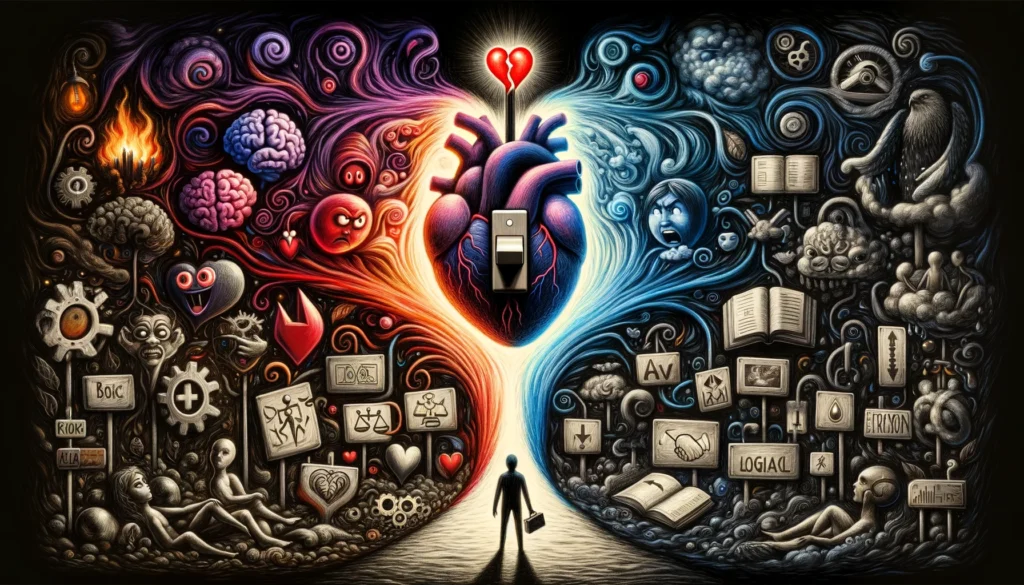 Hook
Hook
Imagine a world where every decision we make is guided solely by our emotions. What if, instead of rational thought, every choice we faced was dictated by raw feelings, from choosing who to marry to deciding on a career path? How would this world look, and more importantly, how would it function?
Thesis Statement
In an intriguing thought experiment, we consider the consequences of replacing our brain with our heart, symbolically speaking. This shift would prioritize feelings, emotions, and desires, overriding the logical processes that typically guide our actions. While emotions are integral to our human experience, allowing them to take complete control could lead to unbridled chaos, leading to substantial harm both to ourselves and to those around us.
Overview
This exploration will traverse the landscape of emotion-led decisions across various domains, from personal relationships to societal structures. We will delve into the biological roles of the brain and heart, examine historical and cultural precedents, and discuss the psychological impacts of such a swap. By contemplating extreme scenarios and practical, real-world advice, this post will highlight the critical need for a balance between our emotional inclinations and rational thoughts, ensuring that we navigate our lives with wisdom and empathy.
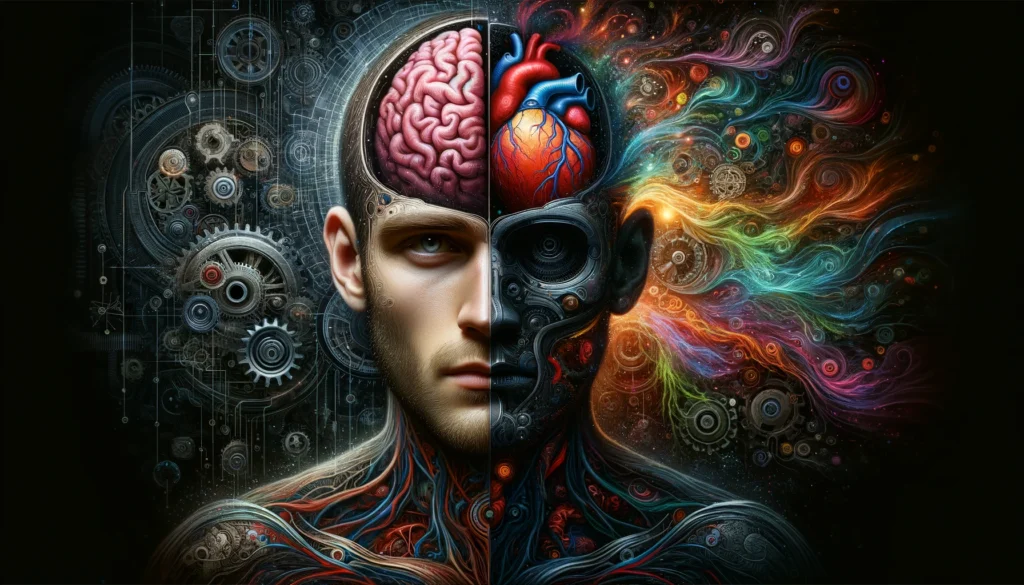 The Role of the Brain vs. The Heart
The Role of the Brain vs. The Heart
Biological Functions
Primary Functions of the Brain and Hear
- The brain, a complex organ, serves as the control center of the body. It is responsible for processing sensory information, regulating bodily functions, and orchestrating thoughts, memories, and emotions. It ensures that we respond appropriately to the environment around us, facilitating everything from movement to speech.
- The heart, primarily a muscular organ, is pivotal in pumping blood throughout the body, delivering oxygen and nutrients to tissues and removing carbon dioxide and wastes. Its rhythmic contractions are vital for sustaining life and maintaining the circulation that supports all other bodily functions.
Metaphorical Representations
Throughout literature and culture, the heart is often endowed with attributes far beyond its physical functions. It is symbolically portrayed as the seat of emotions and desires, a source of wisdom and love, and the essence of one’s true self or soul. From Shakespeare’s romantic plays to modern songs and poems, the heart represents innermost feelings and unspoken truths.
Emotion and Logic
Brain’s Regulation of Emotions
Emotions, while felt deeply within our being, are regulated by various structures within the brain. The limbic system, which includes the amygdala, hippocampus, and hypothalamus, plays a crucial role in emotional processing. These areas are responsible for the perception of emotion, the integration of emotional experiences with long-term memory, and the physiological responses to emotional stimuli. Neurotransmitters and hormones also play significant roles in modulating our mood and emotional responses.
Symbolic Link of the Heart to Emotions
Symbolically, the heart is often linked to our deepest emotions and desires, serving as a poetic counterpart to the more clinical brain. It’s frequently depicted as having the capacity to “feel” in a way that transcends intellectual understanding, representing a purer, more intuitive form of knowledge. In many cultures, phrases like “follow your heart” or “heartbroken” emphasize the heart’s role in our emotional and desire-driven responses, suggesting a kind of wisdom that is emotional rather than rational.
This section of the essay will explore how the juxtaposition of the brain’s logical capabilities against the heart’s emotional depth informs much of our understanding of human behaviour, highlighting the complexities of human nature where logic and emotion intertwine.
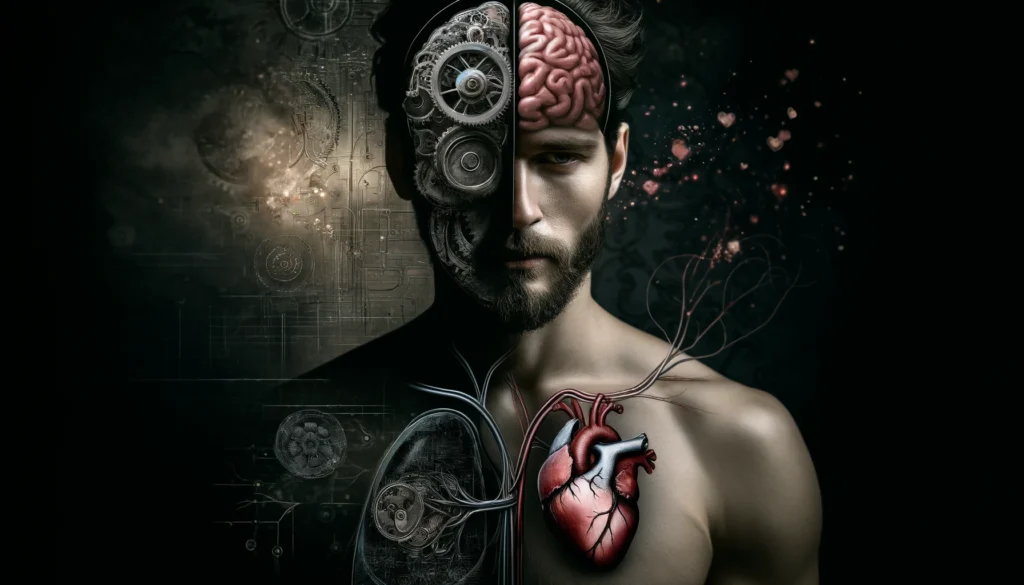 The Impact of Emotion-Driven Decisions
The Impact of Emotion-Driven Decisions
Historical and Cultural Examples
Historical Outcomes of Emotion-Led Decisions
King Henry VIII’s decision to sever the Church of England from the Roman Catholic Church was driven largely by his personal desires and emotional frustrations over not having a male heir with his then-wife, Catherine of Aragon. This monumental emotional decision changed the religious landscape of England forever.
– The launch of the Trojan War, as mythologized in Homer’s *Iliad*, stemmed from Paris’s emotional decision to elope with Helen, leading to a protracted and devastating conflict between Troy and the Greek states.
Literary and Cinematic Examples
- In Shakespeare’s “Romeo and Juliet,” the young lovers’ decisions, driven by intense emotions rather than rational thought, lead to tragic consequences. This illustrates the peril of allowing passion to dictate actions without balancing reasoned consideration.
- The film Atonement showcases how Briony Tallis’s impulsive and emotionally charged decision as a young girl leads to devastating lifelong repercussions for her sister and her lover. It highlights the dramatic impacts of misjudged situations based on emotional immaturity and jealousy.
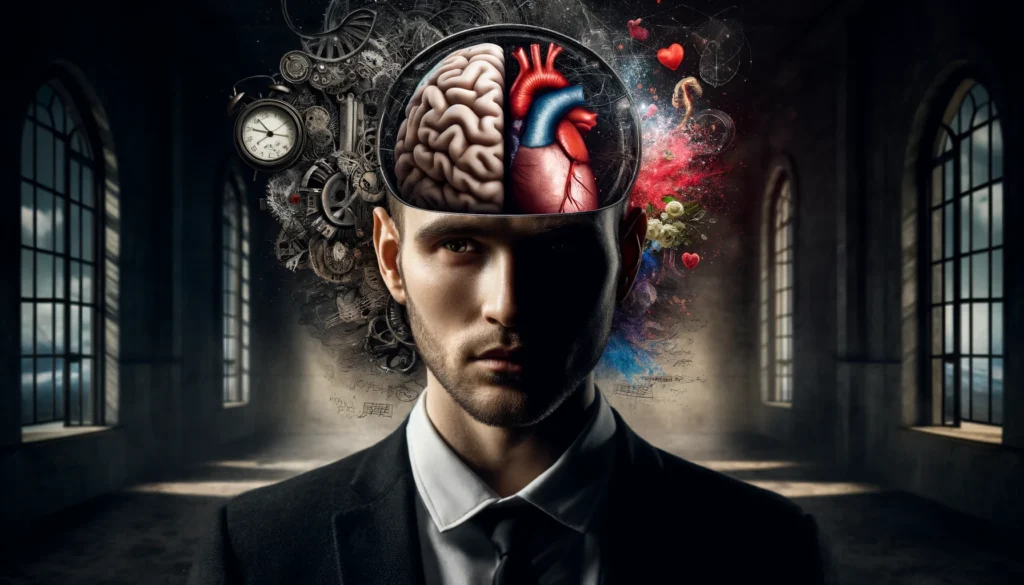 Psychological Perspective
Psychological Perspective
Dangers of Emotional Reasoning
- Psychological theories such as Cognitive-Behavioral Therapy (CBT) highlight the pitfalls of emotional reasoning, a cognitive distortion in which individuals take their emotions as evidence of truth. This reasoning can lead to skewed perceptions of self and others, often resulting in poor decision-making.
- Emotional reasoning can amplify negative thinking patterns and contribute to mental health disorders such as depression and anxiety, where individuals may interpret situations more negatively than they are, driven by their emotional states.
Impact of Heightened Emotional States
- Heightened emotional states such as anxiety or impulsiveness can significantly impair an individual’s ability to make rational decisions. For example, in states of high anxiety, a person might overestimate the risk of negative outcomes, leading to avoidance behaviours or hasty decisions aimed at immediate relief rather than long-term benefits.
- Impulsiveness, often heightened during intense emotional upheavals, can lead to actions without considering the consequences, resulting in decisions that might be regretted later. Research in behavioural psychology and neuroscience links impulsivity to various neural pathways that bypass rational, long-term planning in favour of immediate gratification.
This section of the essay explores the substantial influence emotions can have on decision-making, both historically and in fictional narratives. It examines the psychological mechanisms behind why emotion-driven decisions can often lead to suboptimal or even disastrous outcomes.
The Consequences of Uncontrolled Emotions
Personal Relationships
-Impact on Relationships Without Rational Thought
- Decisions driven solely by emotions can lead to impulsive actions that might hurt personal relationships, such as saying hurtful things in anger or making hasty commitments based on transient feelings of love or attachment. This impulsivity can erode trust and stability, key pillars of healthy relationships.
- Emotional decisions often do not consider the long-term effects on relationships, potentially leading to cycles of conflict, resentment, and disconnection. For instance, constant jealousy or insecurity-driven accusations can push partners away, fostering a toxic environment.
Role of Emotional Intelligence
- Emotional intelligence (EI) plays a crucial role in managing personal and professional relationships effectively. It involves the ability to recognize, understand, and manage one’s own emotions and empathize with the emotions of others.
- High EI contributes to healthier relationships by enabling individuals to communicate more effectively, resolve conflicts efficiently, and respond to others’ emotional needs. In the workplace, EI is linked to better teamwork, leadership, and overall job performance, showing how crucial emotional management is in professional settings.
Societal Impact
Consequences in Leadership and Governance
- If leaders or significant public figures make decisions driven solely by emotions, the results can be unpredictable and potentially harmful. Emotional decision-making can lead to rash policies or diplomatic blunders, as leaders might react hastily to threats or insults without fully considering the long-term consequences.
- For example, historical events such as the Cuban Missile Crisis were dangerously escalated by emotional responses but were ultimately resolved through careful, rational negotiation. The potential for disaster in such emotionally charged situations highlights the need for controlled, thoughtful leadership.
Historical Events Influenced by Strong Emotions
- The Reign of Terror during the French Revolution is a prime example of how uncontrolled emotions such as fear and anger can lead to extreme societal actions, including mass executions and widespread panic. The leaders, driven by paranoia and vindictiveness, made decisions based on emotional reactions to perceived threats, resulting in severe consequences for society.
- Emotional responses to economic crises, like the Great Depression, have also spurred significant social upheaval and policy changes, sometimes leading to further conflict or, conversely, to reforms intended to stabilize and improve societal welfare.
This section of the essay will delve into how uncontrolled emotions can negatively affect personal relationships and societal structures, highlighting the importance of emotional intelligence and rational thought in maintaining harmony and effective governance.
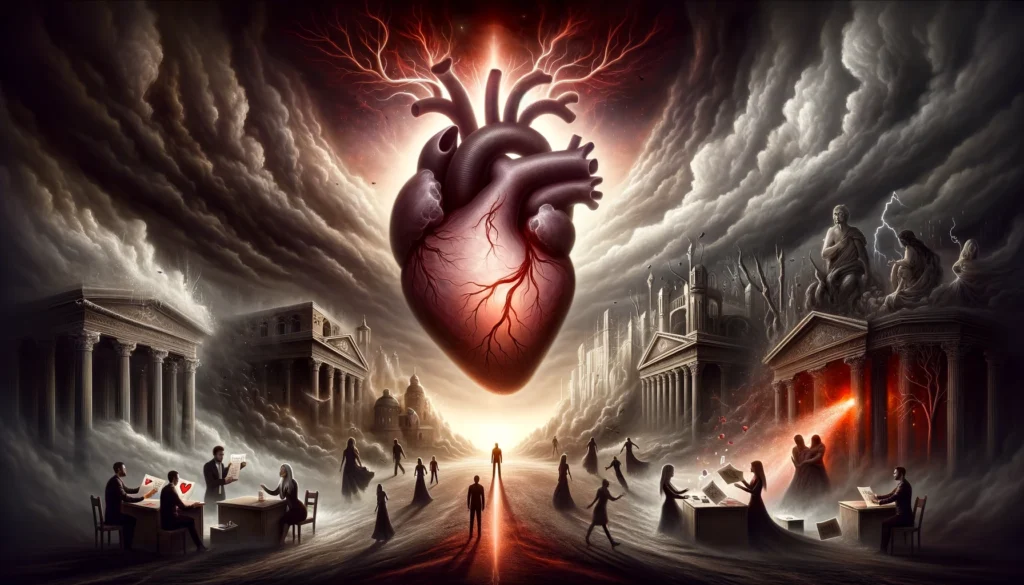 The Need for Balance
The Need for Balance
Philosophical Views
Philosophical Arguments for Balance
- Many philosophers argue for the essential balance between emotion and reason as a cornerstone of ethical living and effective decision-making. Aristotle’s concept of the “Golden Mean” suggests that virtue lies between two extremes, advocating moderation in emotional responses and rational thought.
- The Stoics, particularly Seneca and Marcus Aurelius, emphasized the importance of controlling one’s emotional reactions to maintain inner peace and make just decisions. They believed that while emotions are natural, the wise person does not allow them to overshadow reason.
Advocating for the Middle Path
- Eastern philosophies, such as Buddhism, often discuss the middle path as an approach to life that avoids the extremes of sensory indulgence and self-denial. This path includes managing emotions in a way that avoids attachment to fleeting feelings, promoting a steady, mindful engagement with the world.
- Contemporary thinkers like Martha Nussbaum have also explored the necessity of integrating emotions into the fabric of rationality. They argue that emotions have cognitive content that can inform ethical reasoning and decision-making, enhancing our understanding and responses to the world around us.
Modern Psychological Insights
Importance of Balancing Emotion with Reason
- Modern psychological research supports the idea that emotional health and cognitive functionality are deeply intertwined. Studies show that well-balanced emotional and cognitive processing leads to better mental health, higher problem-solving skills, and more effective interpersonal relationships.
- The Dual-Process Theory in psychology illustrates how our fast, intuitive, and emotional ‘System 1’ and our slower, more deliberate, and logical ‘System 2’ must work together to optimize thinking and decision-making, demonstrating the practical need for balance between these systems.
Techniques for Improving Emotional Regulation
- Techniques such as mindfulness meditation have been shown to enhance emotional regulation by increasing awareness of one’s thoughts and feelings without immediate reaction, fostering a balanced perspective.
- Cognitive-behavioural strategies help individuals challenge and change unhelpful cognitive distortions and behaviours, improve emotional regulation, and develop personal coping strategies that target solving current problems. Such techniques are widely used to teach how to separate immediate emotional responses from more measured, thoughtful behaviours.
- Emotional intelligence training programs in both educational and corporate settings focus on developing skills like empathy, self-awareness, and self-regulation, further promoting a balanced approach to handling emotions in various life contexts.
This section of the essay explores the philosophical and psychological perspectives on the necessity of balancing emotion with reason, offering insights into how this balance can be achieved and maintained through various techniques and philosophical understandings.
 Hypothetical Scenarios
Hypothetical Scenarios
Extreme Scenarios
-A World Governed by Uncontrolled Emotions
- Imagine a political landscape where leaders react impulsively to international provocations without diplomatic deliberation, leading to frequent conflicts and unstable international relations. Policies are made based on temporary public sentiments rather than long-term benefits, resulting in fluctuating laws that confuse and destabilize society.
- In education, teachers base their assessments on how they feel about students rather than objective criteria, creating an unfair and biased system that demoralizes students and undermines educational integrity.
- Healthcare decisions made under the sway of intense emotions could lead to inconsistent care standards. Doctors might prioritize patients based on emotional responses to their cases rather than medical urgency, leading to inefficient and potentially harmful healthcare delivery.
Potential Chaos in Various Sectors
- In politics, emotional governance could result in erratic and short-sighted policies. Laws frequently change in response to the shifting emotional states of leaders or the public mood, causing legislative and economic instability.
- In education, if emotional whims rather than rational curriculum development guide teaching, it could impair students’ development of critical thinking skills, leading to a less informed and rational future populace.
- Healthcare systems might collapse under the strain of emotionally charged mismanagement, where crucial resources are allocated based on sympathy rather than systematic need, potentially exacerbating crises like pandemics or natural disasters.
Reversal Scenarios
A World Driven by Extreme Rationality
- Consider a scenario where all decisions are made with cold logic, utterly devoid of emotional consideration. In such a world, policies might be efficient but brutally unsympathetic to individual human suffering. For instance, economically unproductive individuals might be denied social aid or healthcare based on cost-efficiency models.
- In education, a purely rational approach could ignore the emotional and psychological needs of students, focusing solely on output and performance metrics, possibly leading to high levels of student burnout and mental health issues.
- In healthcare, decisions based strictly on statistics and survival probabilities could mean that treatments are denied to patients with lower chances of recovery, disregarding the human aspect of medical care.
Analysis of Detrimental Effects
- Both scenarios have significant drawbacks. An emotion-driven world may lack consistency and rational foresight, leading to volatile and unsustainable societal structures. Conversely, a world governed solely by rational thought might lack empathy, leading to harsh and inhumane outcomes.
- Comparatively, the scenario with extreme rationality might be seen as more detrimental in terms of human welfare, as it completely ignores the emotional and psychological well-being of individuals, which are essential for a harmonious and humane society.
This section of the essay will explore these hypothetical extremes to illustrate the chaos and potential harm that could arise from unbalanced governance in emotion or reason, underlining the importance of maintaining a delicate balance between the two for optimal societal function.
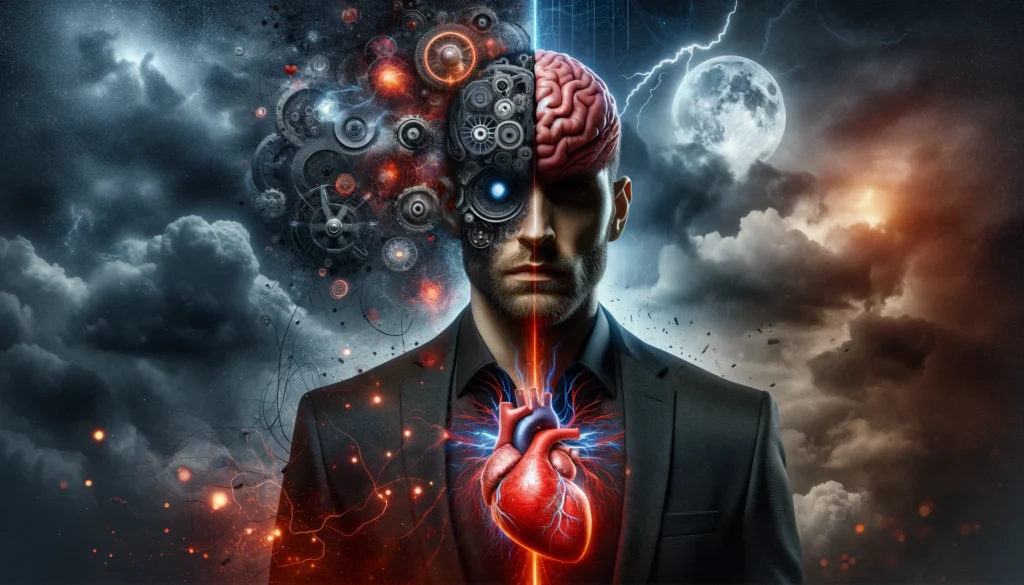 Real-Life Applications and Advice
Real-Life Applications and Advice
Practical Advice
Balancing Emotions and Rational Thoughts
- Self-awareness: Encourage readers to cultivate self-awareness by regularly reflecting on their emotions and the reasons behind their reactions. Keeping a journal can be an effective way to track emotional triggers and patterns.
- Mindfulness: Practice mindfulness techniques such as meditation or focused breathing exercises. These practices help individuals stay present and aware, reducing the likelihood of being overwhelmed by emotions.
- Cognitive restructuring: Teach readers to challenge their automatic thoughts and consider more rational, balanced perspectives. This can be done through questioning the evidence for their emotional reactions and considering alternative explanations.
Daily Practices for Emotional and Cognitive Health
- Regular physical activity: Physical exercise has been proven to reduce stress, improve mood, and enhance cognitive function.
- Healthy social interactions: Maintain a supportive social network. Social interactions can provide different perspectives and help moderate emotional extremes.
- Adequate rest and nutrition: Emphasize the importance of good sleep and balanced nutrition, both of which significantly affect cognitive function and emotional regulation.
Technological and Therapeutic Interventions
Role of Technology in Managing Emotions
- Emotion-tracking apps: Discuss how apps that track mood and emotional states can provide insights into emotional patterns, helping users recognize triggers and manage emotional responses more effectively.
- AI-based therapy tools: Highlight how AI interventions, like chatbots for mental health support, can provide immediate, low-barrier assistance for managing stress and emotional crises, offering coping mechanisms and sometimes even cognitive behavioural therapy techniques.
Therapeutic Approaches for Emotional Regulation
- Professional counselling and therapy: If readers struggle significantly with emotional regulation, encourage them to consider seeking professional help. Therapies like Cognitive Behavioral Therapy (CBT) and Dialectical Behavior Therapy (DBT) are highly effective in teaching individuals how to balance their emotional and rational responses.
- Group therapy and workshops: Suggest participation in group therapy sessions or emotional intelligence workshops, which can provide strategies for managing emotions and making more balanced decisions in a supportive, communal setting.
This section would provide readers with actionable advice and introduce them to both traditional and innovative ways to improve emotional and cognitive functioning. By integrating these practices into their daily lives, individuals can achieve a healthier balance between their emotions and rational thoughts, leading to better decision-making and overall well-being.
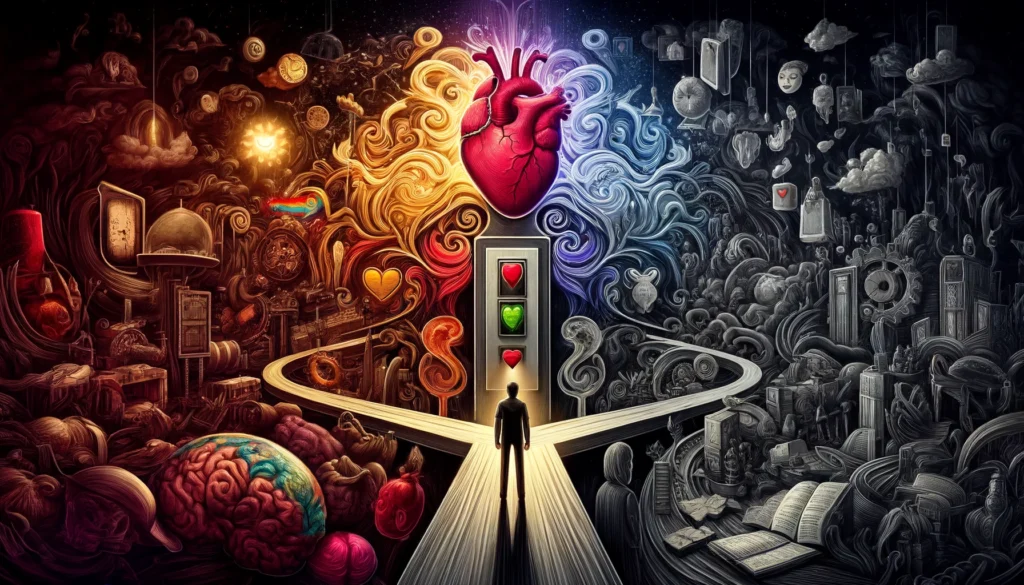 Summary
Summary
Throughout this exploration, we’ve delved into the complex interplay between the heart, the emblem of our emotions and the brain, our center of logic and reasoning. From examining the roles of each through historical and cultural lenses to the tangible impacts of their dominance on personal, societal, and global scales, the message has been consistent: a balanced integration of emotion and reason is crucial. We’ve explored both the chaos of extreme emotional dominance and the coldness of pure rationality, finding that neither extreme serves us well in creating a just, functional, or compassionate society.
Final Thoughts
Embracing both the emotional and rational aspects of our nature is not merely beneficial but essential. Our emotions can guide us to what matters most, while our rationality can provide the path to achieving those values sustainably and ethically. Recognizing the strengths and limitations of both aspects of our minds leads to a fuller, more nuanced approach to life. In essence, the harmonious cooperation between our emotional intuitions and our logical deliberations enriches our experiences and decisions, making us wiser and more empathetic.
Call to Action
Let us strive to cultivate this balance daily. Challenge yourself to pause and reflect when emotions surge, asking what they signal and how best they can be addressed. Similarly, in moments of cold analysis, consider the human element and how decisions affect others on an emotional level. Through conscious practice, we can enhance our ability to navigate the complexities of life with both compassion and precision.
Additional Elements
Case Studies and Interviews
- Interviews with Psychologists: Insights from professionals who apply the principles of emotional and rational balance in therapeutic settings, providing real-world applications and benefits.
- Personal Success Stories: Case studies of individuals who have achieved significant personal growth or professional success by mastering the art of balancing emotion with reason, offering relatable and inspiring narratives.
References and Further Reading
- Thinking, Fast and Slow by Daniel Kahneman — A seminal book discussing the dual-process model of the human mind.
- Emotional Intelligence by Daniel Goleman — This book explores the profound impact of emotional intelligence on personal and professional success.
- Academic papers and resources on Cognitive Behavioral Therapy and its impacts on emotional regulation.
- Articles and essays by philosophers and contemporary thinkers on the importance of balancing logic and emotion in ethical decision-making.
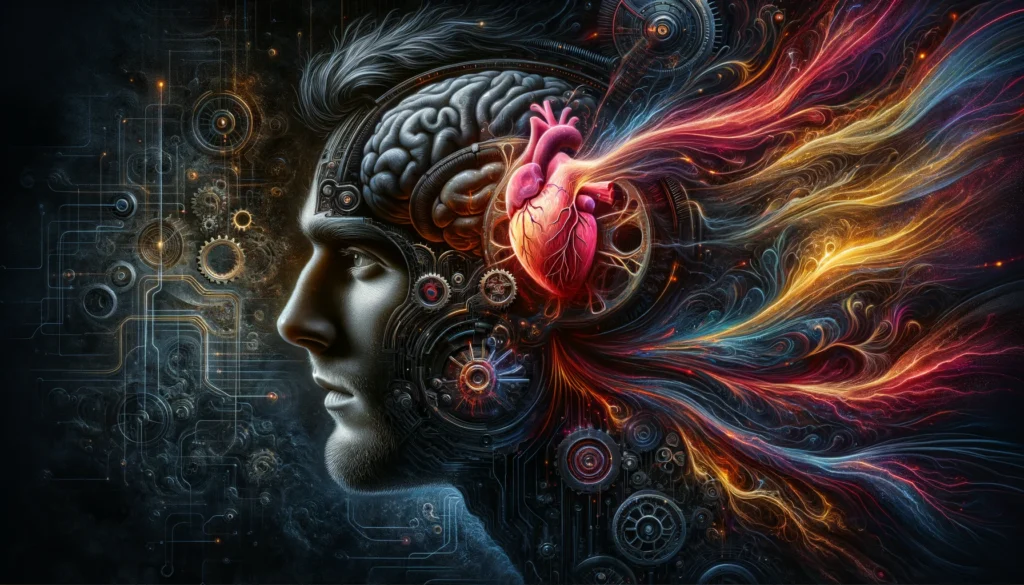



Masterfully delves into the implications of an emotion-driven world, highlighting the critical need for balancing feelings and rational thought for a harmonious existence. Amazing